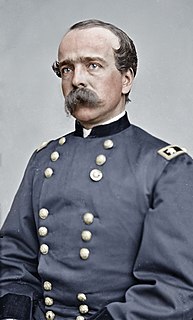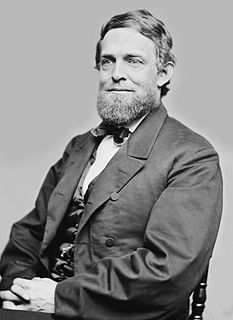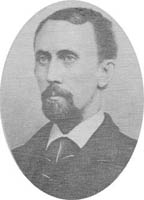 W
WOrville Elias Babcock was an American engineer and general in the Union Army during the Civil War. An aide to General Ulysses S. Grant during and after the war, he was President Grant's private secretary at the White House, Superintendent of Buildings and Grounds for Washington D.C., and a Florida-based federal inspector of lighthouses. Babcock continued to serve as lighthouse inspector under Grant's successors Rutherford B. Hayes, James A. Garfield, and Chester A. Arthur.
 W
WAdam Badeau was an American author, Union Army officer, and diplomat. He is most famous for his service on the staff of Ulysses S. Grant during the American Civil War and his subsequent three-volume biography of Grant. Badeau enjoyed a successful career as a writer, and assisted Grant with the research, fact checking, and editing when Grant authored Personal Memoirs of Ulysses S. Grant.
 W
WDaniel Adams Butterfield was a New York businessman, a Union General in the American Civil War, and Assistant U.S. Treasurer.
 W
WSchuyler Colfax Jr. was an American journalist, businessman, and politician who served as the 17th vice president of the United States from 1869 to 1873, and prior to that as the 25th speaker of the House of Representatives from 1863 to 1869. A member of the Republican Party, he was the U.S. Representative for Indiana's 9th congressional district from 1855 to 1869.
 W
WJames Fleming Fagan was a farmer, politician, and a senior officer of the Confederate States Army during the American Civil War. His brigade distinguished itself in the Camden Expedition of 1864, helping to drive the Federal army from southwest Arkansas.
 W
WEly Samuel Parker, born Hasanoanda, later known as Donehogawa, was a Tonawanda Seneca U.S. Army officer, attorney, engineer, and tribal diplomat. He was commissioned a lieutenant colonel during the American Civil War, when he served as adjutant and secretary to General Ulysses S. Grant. He wrote the final draft of the Confederate surrender terms at Appomattox. Later in his career, Parker rose to the rank of brevet brigadier general. When Grant was elected president, he appointed Parker as Commissioner of Indian Affairs, the first Native American to hold that post.
 W
WHorace Porter was an American soldier and diplomat who served as a lieutenant colonel, ordnance officer and staff officer in the Union Army during the American Civil War, personal secretary to General and President Ulysses S. Grant. He also was secretary to General William T. Sherman, vice president of the Pullman Palace Car Company and U.S. Ambassador to France from 1897 to 1905.
 W
WColonel Hiram C. Whitley was the second Chief of the United States Secret Service.
 W
WHenry Wilson was the 18th vice president of the United States (1873–75) and a senator from Massachusetts (1855–73). Before and during the American Civil War, he was a leading Republican, and a strong opponent of slavery. Wilson devoted his energies to the destruction of the "Slave Power" – the faction of slave owners and their political allies which anti-slavery Americans saw as dominating the country.